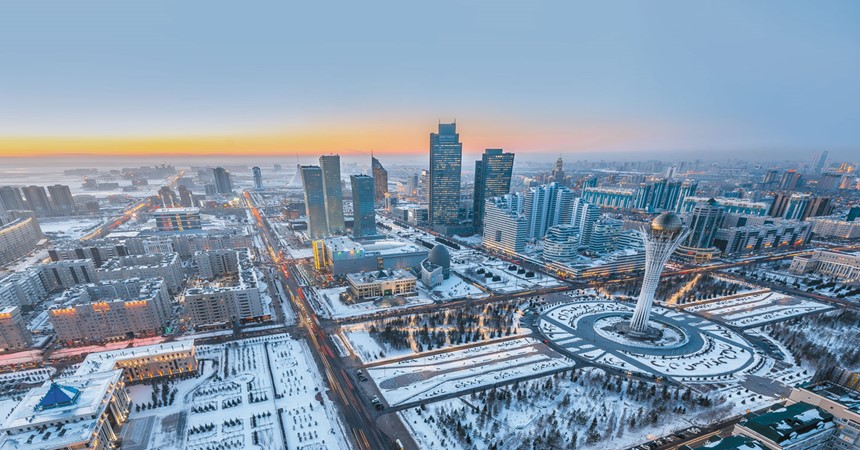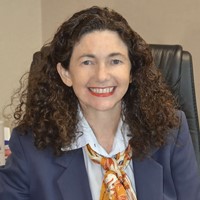Because of our teachers, my sisters, Jacinta, Michelle and Gabrielle, are also professionally involved in education. Our late father, Tom, firmly believed in high-quality education for his daughters. In his volunteer work for the St Vincent de Paul Society, he often helped women with young children who were obliged to leave untenable family situations and had no income. He encouraged us all to be independent and he saw education as essential.
I write these words in the Office of the Vice Provost for Academic Affairs, at Nazarbayev University (NU), Astana, Kazakhstan.
It is early November and light snow covers the city and the campus. At 8am it is still dark and there is a magical element to the lights shining on the new buildings and the glass skywalks. Almost all our students and academics live on campus. Most students receive free education and subsidised accommodation. Students and academics use the skywalks to walk from the residential blocks to the lecture halls and classrooms so they are protected from extreme weather conditions. It can reach -40 degrees Celsius in winter and 40+ degrees in summer. Even so, it is a beautiful, well-designed and uplifting environment.
Working here is a chance to be part of history. It is a liminal moment as this newly independent nation moves from a post-Soviet environment towards a modern knowledge economy.
We are growing our student numbers from 4,200 to 8,000 to meet increasing demand for our English language programs at all levels: Foundation, Bachelors, Masters and Doctorate.
As one of seven Australians here, I have learned it is possible to build an international research university in a post-Soviet environment under specific conditions: unequivocal political support at the highest level, appropriate funding for high quality research and for international salaries and advice from top international universities. We have had extraordinary support from all quarters. Our strategic university partners have been partners in every sense of the word.
All our academics are researching and we encourage research-integrated teaching. Our students are mostly from Kazakhstan and must pass competitive entrance examinations. Students are intellectually strong, ambitious and altruistic − and they are the next generation of leaders.
Students continuously ask their professors about their research projects; about what motivates them to keep challenging the boundaries of accepted wisdom; about how they know which research questions are worth asking.
Although we are young, our reputation is enhanced by high profile visitors including Prime Ministers Shinzo Abe, Narendra Modi and David Cameron. Other visitors include the President of the International Monetary Fund, Christine Lagarde; Secretary-General of the OECD, Angel Gurria; former CIA head, David Petreaus and Secretary of State, John Kerry. Nobel prize winners, including Professor George Smoot, work with our faculty on research projects.
Our students attend master classes and guest lectures from visitors who generously answer their questions.
When speaking to students, I often quote John F Kennedy on his inauguration as President of the United States, more than fifty years ago, “I do not believe that any of us would exchange places with any other people or any other generation.”
After four and a half years, I have no regrets at all about taking on the role of Vice Provost of Academic Affairs (somewhat similar to a Deputy Vice Chancellor) and I hope to stay here for several more years.
Family support is essential. My husband, Tim, agreed to this unexpected adventure. Our three daughters were already attending universities in Sydney and Canberra when I was offered the role. Our daughters have thoroughly enjoyed their visits to Astana, especially the amazing “Green Energy” themed Expo held from June to September. We all ran in the recent Astana marathon and holidayed in St Petersburg and Moscow.
There are times in one’s life when unusual opportunities arise, and as my NU colleagues like to say, “You are either up for it or you are not.”
I often say to our NU students that their intellectual journey towards graduation is much more than a journey towards a credential. It can be a journey within ourselves, to make our tacit values more explicit, to redefine our concept of ethical leadership, to test ourselves intellectually and emotionally and to emerge knowing who we are, and what we stand for. We can’t change the world, and make our unique contribution, until we are willing to change ourselves.
These are insights I learned long ago from my teachers at San Clemente and St Anne’s. Education is transformation.
Dr Loretta O’Donnell is Vice Provost for Academic Affairs, Nazarbayev University, Astana, Kazakhstan.























































































